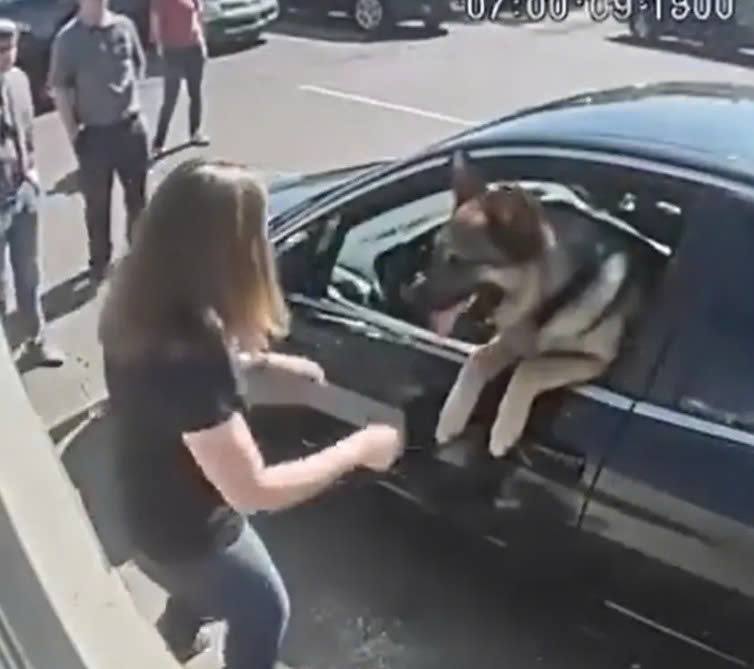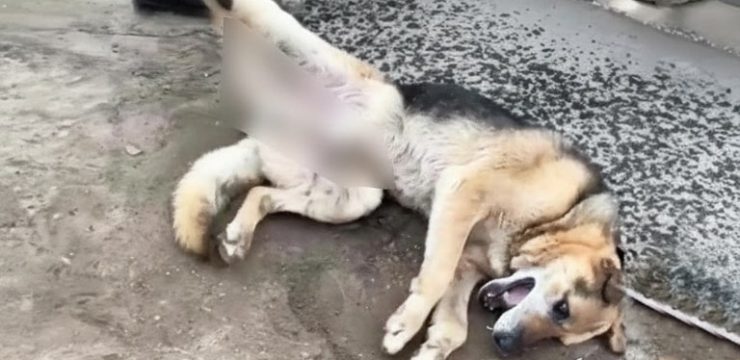The heat that day felt unbearable, the kind of scorching temperature that makes the pavement shimmer and turns the air into something heavy and suffocating. I had barely walked one block when something caught my eye—a silver car parked crookedly under the full sun, all its windows rolled up tight. At first, I thought nothing of it, but then I noticed movement inside. When I stepped closer, my heart dropped. A German Shepherd was locked inside, panting rapidly, its tongue hanging out as it struggled to breathe. Its body trembled with exhaustion, and its eyes were unfocused, like it was seconds away from collapsing. The “water” its owner had supposedly left for it was nothing more than a sealed, unopened bottle rolling uselessly on the car floor. It was painfully clear that this dog was running out of time.

I felt a wave of alarm and compassion hit me at once. I knew I had to act, but I wanted to be fair and responsible. A phone number was scribbled on a note taped to the windshield, so I called it immediately, hoping the owner had simply made a mistake. But instead of concern, all I heard was irritation. He told me to mind my own business, insisted his dog was fine, and claimed the sealed water bottle was more than enough. His tone made it clear he had no intention of returning anytime soon. I remember standing there in disbelief, staring at the suffering dog and thinking: If this isn’t my business right now, then what is? There are moments in life when doing nothing is simply not an option.
So I did what my conscience demanded. I grabbed a large rock lying near the edge of the parking lot, braced myself, and smashed the window. The glass shattered instantly, sending a rush of hot air outward, and the dog practically collapsed into my arms. The poor thing was limp, exhausted, and overheated. I pulled it into the shade and gently stroked its fur, whispering that it was safe now. A few people nearby had heard the noise and started approaching, some already calling out in concern as they realized what had happened.
Not long after, the owner finally showed up. The moment he saw the broken window, he stormed toward us, furious. He didn’t even glance at his dog. He didn’t ask if it was okay. All he cared about was the damage to his car. “What do you think you’re doing?” he yelled loud enough for the whole parking lot to hear. People started gathering, forming a loose circle around us. I stood up, still holding the dog close, and told him calmly, “Your dog was struggling to breathe. You left her inside a hot car. She could have died.”
His anger only grew. He kept insisting I had no right to touch his car and that he was going to call the police. He accused me of overreacting, of making things worse, of sticking my nose where it didn’t belong. But just then, something changed. A woman who had stepped forward earlier lifted her phone and said, “I’m calling animal control.” She wasn’t yelling, she wasn’t dramatic—she was simply firm. Another woman approached me with a bottle of water, opened the cap, and handed it over. “For the dog,” she said softly. It was a small gesture, but at that moment, it meant the world.
The crowd stood with me—not aggressively, not confrontationally, but with a collective understanding that the dog’s well-being mattered more than the man’s outrage. And then, cutting through the noise, a small voice spoke up from behind the man. It was a young boy, maybe nine or ten years old. His voice was quiet but clear as he said, “Daddy… you told me dogs are family. We don’t leave family in the car.”
Those words stopped everything. The man froze, and I watched the anger on his face melt into something else—shame, guilt, realization. He looked at his son, then at the dog, then at the broken window. His expression softened, and his shoulders slumped. “I… I didn’t think it was that hot,” he murmured, almost to himself. For the first time, he seemed to truly understand the danger he had created.
By the time animal control arrived, the parking lot had returned to a calm silence. The officers checked the dog, ensured it was stable, and spoke to the owner about the seriousness of leaving a pet inside a vehicle during extreme heat. They made it clear that what happened could have ended far worse. The owner cooperated quietly, humbled by the situation and deeply affected by his son’s words. The dog, meanwhile, rested in the shade with cool water and gentle attention from the officers. Eventually, the crowd dispersed, reassured that the animal was safe.
On that sweltering day, people who didn’t know each other came together for a moment of compassion. No arguments, no chaos—just a shared belief that doing the right thing matters. The dog survived, the owner learned an important lesson, and everyone walked away reminded that kindness can turn strangers into allies.
If this story inspires you, share it with others. Sometimes the smallest actions create the biggest change—and sometimes, standing up for what’s right can save a life.





